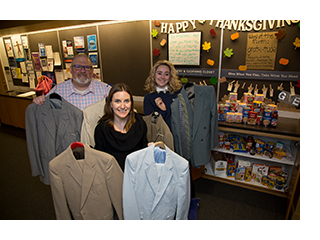NEW FOOD PANTRY AND CLOTHING CLOSET COMBAT FOOD AND FINANCIAL INSECURITY AT DICKINSON LAW
November 19, 2019 — On college campuses across the country, food insecurity—the lack of reliable access to sufficient quantities of affordable, nutritious food—is a serious problem. In a study conducted earlier this year by the Hope Center for College, Community, and Justice, almost half of the college students surveyed (48%) reported food insecurity occurred in the previous 30-day period.
The challenge of food insecurity as well as basic needs insecurity among college students is also prevalent in the law student population.
 Discussion about ways to help students at Dickinson Law with food and financial insecurity began at a Diversity and Educational Equity Committee meeting after Clinical Professor of Law Megan Riesmeyer, who chairs the Committee, mentioned reading several reports about students in higher education not having a home, food or clothing, and the difficulties that posed for them.
Discussion about ways to help students at Dickinson Law with food and financial insecurity began at a Diversity and Educational Equity Committee meeting after Clinical Professor of Law Megan Riesmeyer, who chairs the Committee, mentioned reading several reports about students in higher education not having a home, food or clothing, and the difficulties that posed for them.
“While talking with student committee members, I learned that students within our Law School community were experiencing financial concerns and struggling to buy the essentials they need,” said Riesmeyer. “As a group, we decided it was important to provide a place for students in need to get food without any questions asked.”
Riesmeyer took the Committee’s idea to Associate Dean for Academic and Student Services Jeffrey A. Dodge who quickly made their vision a reality. With support from Dickinson Law’s Technical Services team, the Little Free Pantry was established. Designed to provide free food to any Dickinson Law student experiencing hunger or food insecurity due to financial hardships, the Little Free Pantry features non-perishables, household items and toiletries, and operates on the honor system. To date, donations have come from within the Law School community. Staff check the pantry weekly and remove any expired goods.
“The cabinets were full in no time, which truly speaks to the close-knit culture of our Law School family,” said Dodge. “This is truly a grassroots, homegrown effort.”
Dodge hopes that the Little Free Pantry will allow law students to focus on their studies rather than how to fund their next meal. “It is well documented that food insecurity and related financial issues can inhibit academic success. Students shouldn’t have to choose between school-related expenses and basic needs.”
“I think there is often an assumption in higher education that everyone who is sitting in class with you is able to meet all of their own basic needs, but in reality, there are students who are struggling to get by,” said second-year Dickinson Law student Casey Dennis. “I chose to help with Dickinson Law’s food pantry initiative because I know that students of any age can be more successful when all of their needs are met, which includes making sure they have food on their tables every day.”
Because students are struggling with a myriad of expenses beyond just food, the Office of Student Services next spearheaded the creation of a Professional Clothing Closet adjacent to the Little Free Pantry. Here, students have access to gently-used suits, shirts, ties, blouses, pants, skirts, accessories, and other clothing items.
“We know that some of our students may not have the financial means to acquire professionally suitable clothing for interviews or the workplace,” said Dodge. “We hope this resource eases that pressure.”
For more information about the Little Free Pantry and Professional Clothing Closet at Dickinson Law, contact the Office of Student Services at 717-240-5209. To make a donation online, visit givetopsu.edu/DickinsonLaw, choose “Other,” and note “Dickinson Law Little Free Pantry.” You may also mail a check payable to Penn State University with Dickinson Law Little Free Pantry in the memo line to Kelly Rimmer, Director of Development and Alumni Affairs, Dickinson Law, 150 S. College St., Carlisle, PA 17013.
_________________________
Dickinson Law’s Little Free Pantry and Professional Clothing Closet were created as part of the Law School’s efforts to help students experiencing food and financial insecurity. “It is well documented that food insecurity and related financial issues can inhibit academic success,” said Jeffrey A. Dodge, associate dean of academic and student services pictured with Julie Cullings, co-curricular programs coordinator (front) and Casey Dennis, second-year law student. “Students shouldn’t have to choose between school-related expenses and basic needs.”